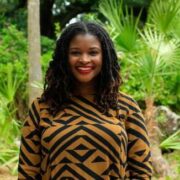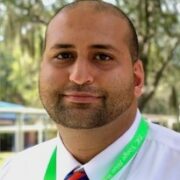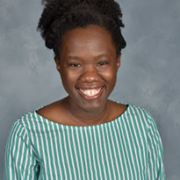Research Spotlight: F. Chris Curran
Q & A with F. Chris Curran, Ph. D., Director of the Education Policy Research Center & Associate Professor in the School of Human Development and Organizations Studies
What research are you currently working on?
My research applies frameworks and methodologies from the field of public policy to improve outcomes and equity in educational systems. In particular, I seek to examine how the laws, policies, and practices of educational institutions shape experiences and outcomes for students of color, students from lower socio-economic backgrounds, and other marginalized groups. My primary areas of research are school safety and discipline as well as early childhood education, though I have written widely about other education policy topics ranging from teacher labor markets to federal policy adoption.
Currently, I am leading several federally funded research projects including a Department of Justice-funded grant to develop a school safety data dashboard and training materials for the state of Florida as well as a National Science Foundation-funded project examining the elementary school science learning trajectories of multi-lingual students. For the school safety dashboard project, we are working with state and non-profit partners to understand how stakeholders use school safety data and to incorporate that feedback into data visualizations that school personnel can use to facilitate data dialogues and target policy and practice changes. The multi-lingual learners and elementary science project is currently supporting the development of multiple graduate students’ skills in the quantitative analysis of large-scale secondary data and has led to multiple presentations to researchers and practitioners.
What is the broader impact of your research?
As a former middle school teacher and local government employee, I design my research to inform and directly impact the policies and practices that shape the educational experiences of young people. I do this by melding different methodological and theoretical perspectives. In one study, I may be leveraging econometric methods with big data to isolate causal effects of programs while in another I may be on the ground in schools interviewing students and teachers. My work spans disciplinary boundaries, including collaborations with sociologists, criminologists, and economists in ways that can provide the greatest insights to inform public policy.
The impact of my research and public scholarship has been far-reaching. I have appeared on CNN and NPR and have had my research discussed in outlets ranging from the Washington Post to The New York Times. This past year, my research even broke into the political comedy space, appearing on an episode of HBO’s Last Week Tonight with John Oliver. I contribute to public policy debates through regular publications in The Conversation and a regular column in the local Gainesville Sun. I have had my research cited in an amicus brief before the Supreme Court, have presented before an advisory board to the US Commission on Civil Rights, and have worked directly with school districts to advise on policy decisions.
What other research topics are you interested in?
In addition to my substantive interest in education policy topics, my work also explores research methodology advancements that can support the study of education policy. I have recently published work in Educational Researcher examining the policy implications of different measurement choices of racial disparities in school discipline. This past year, I hosted an AERA-funded research conference focused on advancing school discipline data. Some of my ongoing work then continues to explore data accessibility, transparency, and the practical implications of analytic choices.
















